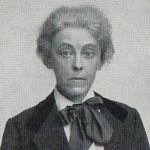Deola passes her mornings sitting in a cafe,
and nobody looks at her. Everyone’s rushing to work,
under a sun still fresh with the dawn. Even Deola
isn’t looking for anyone: she smokes serenely, breathing
the morning. In years past, she slept at this hour
to recover her strength: the throw on her bed
was black with the boot-prints of soldiers and workers,
the backbreaking clients. But now, on her own,
it’s different: the work’s more refined, and it’s easier.
Like the gentleman yesterday, who woke her up early,
kissed her, and took her (I’d stay awhile, dear,
in Turin with you, if I could) to the station
to tell him goodbye.
She’s dazed this morning, but fresh—
Deola likes being free, likes drinking her milk
and eating brioches. This morning she’s nearly a lady,
and if she looks at anyone now, it’s just to pass the time.
The girls at the house are still sleeping. The air stinks,
the madam goes out for a walk, it’s crazy to stay there.
To work the bars in the evening you have to look good;
at that house, by thirty, you’ve lost what little looks you had left.
Deola sits with her profile turned toward a mirror
and looks at herself in the cool of the glass: her face pale,
and not from the smoke; her brow a bit furrowed.
To survive at that house, you’d need a will
like Marí used to have (because, honey, these men
come here to get something they can’t get at home
from their wives or their lovers) and Marí used to work
tirelessly, full of good cheer and blessed with good health.
The people who pass the cafe aren’t distracting Deola—
she only works evenings, making slow conquests
to music, in her usual bar. She’ll make eyes.
at a client, or nudge his foot, while enjoying the band
that makes her seem like an actress doing a love scene
with a young millionaire. One client each evening
is enough to scrape by on. (Maybe that gentleman from last night
really will take me with him.) To be alone, if she wants,
in the morning. To sit in a café. To not look for anyone.



















Comment form: